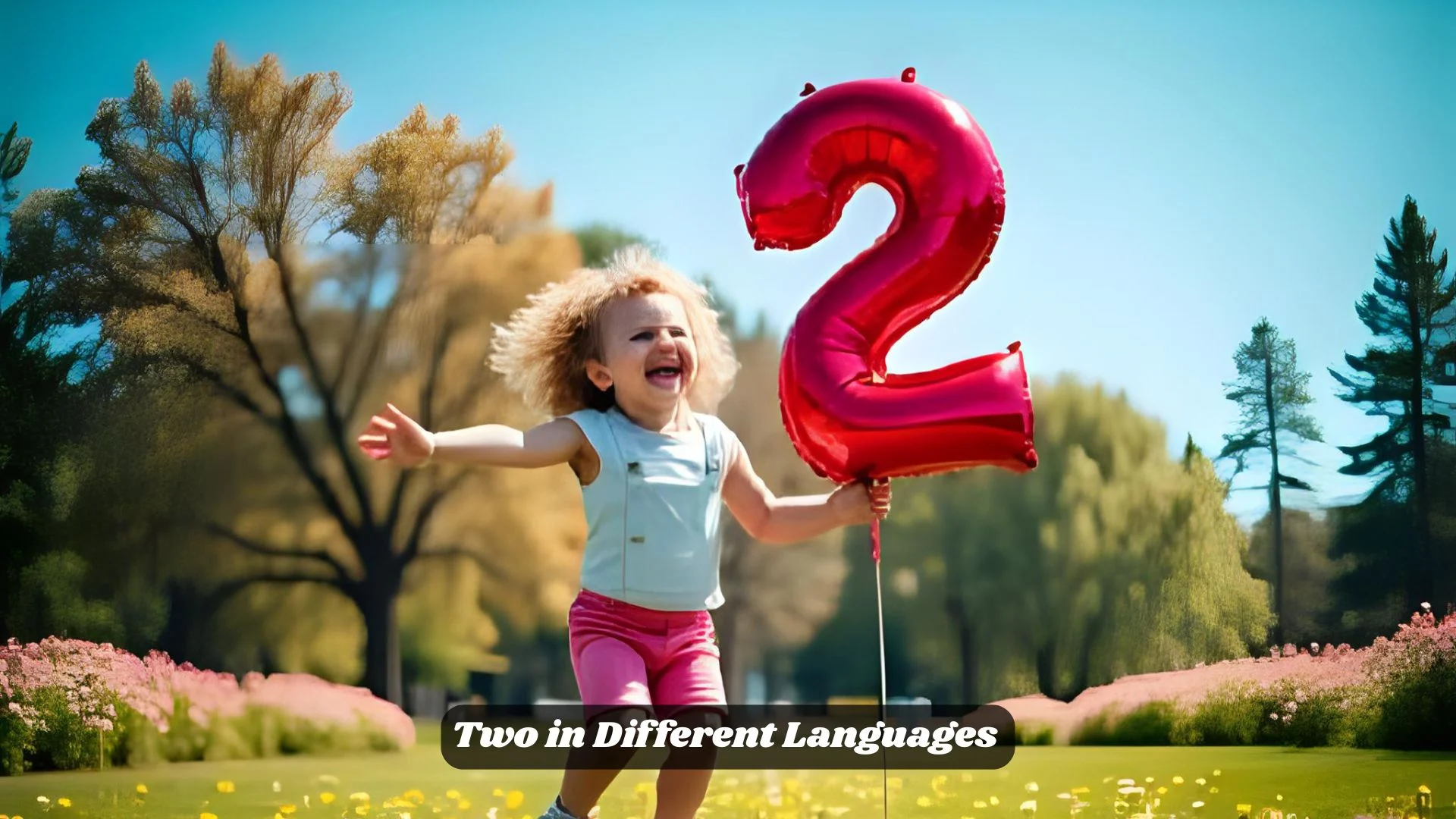Have you ever wondered how to say the number two in different languages?
Whether you’re learning a new language, preparing for a trip, or just love numbers, this article will help you explore the beauty of the word two across cultures.
Many learners and travelers search for how to say two — maybe to order two items, express duality, or just satisfy their curiosity.
This blog will give you everything you need: translations, pronunciations in simple English, and example sentences using two in 70 different languages.
🌍 How to Say Two in 70 Different Languages
Each entry includes:
Language Name (🇨🇳) – [Translation] | Pronunciation: [Simple English]
Example sentence.
- Spanish (🇪🇸) – Dos | Pronunciation: dos
Tengo dos hermanos. - French (🇫🇷) – Deux | Pronunciation: duh
Elle a deux chats. - German (🇩🇪) – Zwei | Pronunciation: tsvy
Ich habe zwei Bücher. - Italian (🇮🇹) – Due | Pronunciation: doo-eh
Voglio due caffè, per favore. - Portuguese (🇵🇹) – Dois | Pronunciation: doysh
Ele tem dois carros. - Russian (🇷🇺) – Два | Pronunciation: dva
У меня два вопроса. - Arabic (🇸🇦) – اثنان | Pronunciation: ith-naan
لديّ اثنان من الكتب. - Turkish (🇹🇷) – İki | Pronunciation: ee-kee
İki elma aldım. - Chinese (🇨🇳) – 二 (èr) | Pronunciation: ar
我有二个妹妹。 - Japanese (🇯🇵) – 二 (に, ni) | Pronunciation: nee
りんごを二つください。 - Korean (🇰🇷) – 둘 (dul) | Pronunciation: dool
사과 두 개 주세요. - Hindi (🇮🇳) – दो | Pronunciation: do
मेरे पास दो किताबें हैं। - Urdu (🇵🇰) – دو | Pronunciation: do
میرے دو دوست ہیں۔ - Bengali (🇧🇩) – দুই | Pronunciation: dui
আমার দুইটা কলম আছে। - Greek (🇬🇷) – Δύο | Pronunciation: thee-oh
Έχω δύο παιδιά. - Polish (🇵🇱) – Dwa | Pronunciation: dvah
Mam dwa psy. - Dutch (🇳🇱) – Twee | Pronunciation: tvey
Ik wil twee appels. - Swedish (🇸🇪) – Två | Pronunciation: tvoh
Jag har två systrar. - Norwegian (🇳🇴) – To | Pronunciation: too
Han har to biler. - Finnish (🇫🇮) – Kaksi | Pronunciation: kahk-see
Minulla on kaksi lasta. - Danish (🇩🇰) – To | Pronunciation: toh
Jeg har to katte. - Hungarian (🇭🇺) – Kettő | Pronunciation: ket-tuh
Két könyvem van. - Czech (🇨🇿) – Dva | Pronunciation: dvah
Mám dva bratry. - Romanian (🇷🇴) – Doi | Pronunciation: doy
Am doi câini. - Swahili (🇰🇪) – Mbili | Pronunciation: mbee-lee
Nina watoto wawili. - Zulu (🇿🇦) – Kubili | Pronunciation: koo-bee-lee
Nginezinja ezimbili. - Xhosa (🇿🇦) – Zimbini | Pronunciation: zeem-bee-nee
Ndineencwadi ezimbini. - Vietnamese (🇻🇳) – Hai | Pronunciation: hi
Tôi có hai con mèo. - Thai (🇹🇭) – สอง (song) | Pronunciation: song
ฉันมีเพื่อนสองคน. - Indonesian (🇮🇩) – Dua | Pronunciation: doo-ah
Saya punya dua saudara. - Malay (🇲🇾) – Dua | Pronunciation: doo-ah
Dia ada dua kereta. - Tagalog (🇵🇭) – Dalawa | Pronunciation: dah-lah-wah
Mayroon akong dalawang aso. - Esperanto (🌍) – Du | Pronunciation: doo
Mi havas du fratojn. - Catalan (🇦🇩) – Dos | Pronunciation: dos
Tinc dos llibres. - Galician (🇪🇸) – Dous | Pronunciation: dows
Teño dous cans. - Basque (🇪🇸) – Bi | Pronunciation: bee
Bi lagun ditut. - Welsh (🏴) – Dau | Pronunciation: dye
Mae gen i dau frawd. - Irish (🇮🇪) – Dhá | Pronunciation: gaw
Tá dhá chat agam. - Scottish Gaelic (🏴) – Dà | Pronunciation: daah
Tha dà leabhar agam. - Hawaiian (🇺🇸) – ʻElua | Pronunciation: eh-loo-ah
Loaʻa iaʻu ʻelua ʻīlio. - Tamil (🇮🇳) – இரண்டு | Pronunciation: ira-ndu
எனக்கு இரண்டு புத்தகங்கள் உள்ளன. - Telugu (🇮🇳) – రెండు | Pronunciation: ren-du
నాకు రెండు పెన్సిళ్లు ఉన్నాయి. - Kannada (🇮🇳) – ಎರಡು | Pronunciation: era-du
ನನಗೆ ಎರಡು ಪುಸ್ತಕಗಳಿವೆ. - Gujarati (🇮🇳) – બે | Pronunciation: beh
મારે બે પેન જોઈએ છે. - Punjabi (🇮🇳) – ਦੋ | Pronunciation: do
ਮੈਨੂੰ ਦੋ ਕਿਤਾਬਾਂ ਚਾਹੀਦੀਆਂ ਹਨ। - Marathi (🇮🇳) – दोन | Pronunciation: don
माझ्याकडे दोन सायकली आहेत. - Sinhala (🇱🇰) – දෙක | Pronunciation: de-ka
මට පොත් දෙකක් තියෙනවා. - Nepali (🇳🇵) – दुई | Pronunciation: dui
मसँग दुई साथी छन्। - Pashto (🇦🇫) – دوه | Pronunciation: doh
زما دوه ماشومان دي. - Persian (🇮🇷) – دو | Pronunciation: do
من دو دوست دارم. - Hebrew (🇮🇱) – שניים | Pronunciation: shna-yim
יש לי שני אחים. - Amharic (🇪🇹) – ሁለት | Pronunciation: hoo-let
አሁን ሁለት መፅሃፍ አለኝ። - Somali (🇸🇴) – Laba | Pronunciation: lah-bah
Waxaan hayaa laba buug. - Hausa (🇳🇬) – Biyu | Pronunciation: bee-yoo
Ina da littattafai biyu. - Yoruba (🇳🇬) – Meji | Pronunciation: meh-jee
Mo ni awọn ọmọ meji. - Igbo (🇳🇬) – Abụọ | Pronunciation: ah-boo-oh
Enwere m ụmụaka abụọ. - Mongolian (🇲🇳) – Хоёр | Pronunciation: kho-yor
Надад хоёр ном байна. - Tajik (🇹🇯) – Ду | Pronunciation: doo
Ман ду дӯст дорам. - Uzbek (🇺🇿) – Ikki | Pronunciation: ee-kee
Menda ikki kitob bor. - Kazakh (🇰🇿) – Екі | Pronunciation: ye-kee
Менде екі дос бар. - Georgian (🇬🇪) – ორი | Pronunciation: oh-ree
მე მყავს ორი ძმა. - Armenian (🇦🇲) – Երկու | Pronunciation: yer-koo
Ես ունեմ երկու ընկեր: - Lao (🇱🇦) – ສອງ | Pronunciation: song
ຂ້ອຍມີໝາສອງຕົວ. - Khmer (🇰🇭) – ពីរ | Pronunciation: pee
ខ្ញុំមានសៀវភៅពីរ។ - Burmese (🇲🇲) – နှစ် | Pronunciation: hnit
ကျွန်ုပ်တွင်စာအုပ်နှစ်အုပ်ရှိသည်။ - Tongan (🇹🇴) – Ua | Pronunciation: oo-ah
Oku ou maʻu ngaahi tohi ua. - Samoan (🇼🇸) – Lua | Pronunciation: loo-ah
E i ai aʻu tusi e lua. - Maori (🇳🇿) – Rua | Pronunciation: roo-ah
E rua āku hoa. - Maltese (🇲🇹) – Tnejn | Pronunciation: t-neyn
Għandi żewġt iklieb. - Esperanto (🌍) – Du | Pronunciation: doo
Mi havas du katojn.
✅ Conclusion
No matter where you go in the world, the word two always brings people together in pairs, balance, and harmony.

James Parker is a passionate and insightful American author known for his unique ability to connect complex ideas with everyday experiences. With a background in creative writing and over a decade of experience in the literary world, James has dedicated his career to inspiring readers through thoughtful storytelling and practical wisdom.
His writing style is modern, engaging, and deeply reflective, often focusing on personal growth, human relationships, and the subtle beauty of life’s challenges. James Parker’s work is highly respected for its authenticity and relevance, making him a favorite among readers seeking both knowledge and emotional connection.
Over the years, James has authored several impactful books, including “The Path Within”, “Finding Clarity”, and “Bridges of Thought”, which continue to resonate with audiences around the world.

